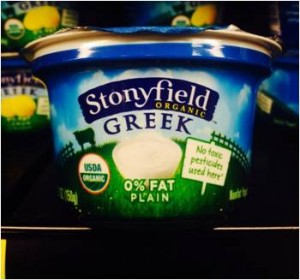Greek Yogurt: Worth the Price?
 It only takes a stroll down the dairy aisles of the supermarket to realize that there are literally hundreds of yogurt brands to choose from. Over the last few years Greek style yogurts have gained in popularity and for some very good reasons. Greek yogurt has a thicker, creamier consistency (even the fat free versions) as compared to standard yogurt. The thickness comes from the fact that the yogurt is actually strained an extra time in the yogurt making process, so its water content is lower.
It only takes a stroll down the dairy aisles of the supermarket to realize that there are literally hundreds of yogurt brands to choose from. Over the last few years Greek style yogurts have gained in popularity and for some very good reasons. Greek yogurt has a thicker, creamier consistency (even the fat free versions) as compared to standard yogurt. The thickness comes from the fact that the yogurt is actually strained an extra time in the yogurt making process, so its water content is lower.
Aside from the consistency factor, the nutritional comparisons make the Greek yogurt a good choice for many. Side by side comparisons to regular yogurt show that the Greek style yogurts generally have a lower carbohydrate and sugar content and are much higher in protein. While a standard 6 oz. cup of light yogurt has about 16-19 grams of carbohydrate and sugars, the 5.3 oz cup of Greek yogurt usually has about 12 grams of carbohydrate and sugars. Light yogurts typically have 5 grams of protein per 6 oz. cup while Greek yogurt boasts 14-15 grams of protein. Calorie comparisons of light vs. Greek nonfat yogurts are pretty close: about 110 calories per serving for either.
Understand that if enough sugar is added to yogurt for sweetening (such as fruit on the bottom styles), the calories can be as high as 250 calories per 6 oz. cup. Most Greek yogurts are not sweetened to this degree.
For a diabetic or someone counting their carbs, Greek yogurt can work out very well as a healthful snack. The higher protein content is more filling and satisfying, especially as a between meal snack.
One area where regular yogurt surpasses the Greek versions is the calcium content. The extra straining process for Greek yogurt results in calcium being strained off as well. Regular yogurt contains 350-400 mg calcium per serving vs. Greek yogurt at 200 mg. per serving.
Aside from the nutritional differences between the yogurts, there is also the cost factor to consider. In general, Greek yogurt is more expensive and typically is around twice the price of regular yogurt. Despite the heftier price, I find myself gravitating more toward the Greek yogurt, because it fits my need for an afternoon snack that is low in calories and a good source of protein.
Whatever you decide, your choice to include yogurt in your diet is probably not a bad one. Do some taste comparisons, cost comparisons and if you’re so inclined try making your own Greek yogurt.
© 2012, Gretchen Scalpi. Publication rights granted to all venues so long as article and by-line are reprinted intact and all links are made live.
Gretchen Scalpi is an author, consultant, speaker and Registered Dietitian-Nutritionist, Certified Diabetes Care & Education Specialist, and Health & Wellness Coach. She opened her private nutrition practice in 2002. Gretchen’s practice provides individual nutritional counseling in the areas of diabetes, weight management, food sensitivities, gastrointestinal disorders, and general wellness.